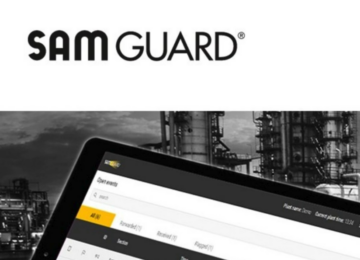May 22, 2024
By: Lena Klebanov
SAM GUARD® and CemAI: Creating a more efficient cement industry.
CemAI is the exclusive licensor of SAM GUARD® for the cement industry, and delivers its predictive analytics together with their own remote operating service that assists cement companies to optimize the value of SAM GUARD®. CemAI sees SAM GUARD® as a key step in helping cement plants to reduce downtime and costs and increase overall equipment efficiency.
We spoke to Scott Ziegler, the CEO of CemAI, about the ways that CemAI applies SAM GUARD®, what kind of a difference predictive analytics can bring to the industry, and what he expects for the future of cement manufacturing.
Can you tell us a little about CemAI?
CemAI is a relatively was founded about two and a half years ago as an offshoot of TITAN Cement, which is a mid-sized cement company based in Athens, Greece. After starting to use the SAM GUARD predictive analytics solution, they quickly recognized the value that it brings to cement plants, and established CemAI as an affiliate company to deliver the solution across the industry.
We customize the SAM GUARD® technology to the specific needs of the cement industry and add our expertise in the industry as a service alongside the software. We are already working with a number of significant cement companies in Africa, Europe, and North and South America, and our goal is to work with 200-250 plants within the next 5-6 years.
What changes have you seen in the cement industry?
The last 10-15 years brought a massive transformation. 15 years ago, there was no sign of machine learning (ML) or any artificial intelligence (AI) technologies. It was a very labor-intensive industry that relied on human monitoring through eyes on the plant. But as the technology improved, plants increased digitization and introduced more sensors for digital monitoring.
Now that most plants are well equipped with sensors and are producing and gathering data, they are moving to implement ML and AI on top. At the same time, we’ve seen a huge increase in focus on energy efficiency and reducing CO2 emissions, pushing it high up on the agenda and requiring new solutions to achieve it. That said, it’s still an industry where if something breaks, you need to send in the mechanics or engineers to fix it. You can’t automate or digitize repairs.
What does CemAI bring to cement plants?
We bring the knowledge about what needs to be done to prevent downtime and extend equipment life cycle. Downtime is consequential for cement plants. The cement kiln, which is the heart of the plant, works 24/7. The average plant produces 3,000 tons of cement per day, which retails for approximately $100 per ton. If you need to stop the kiln, it takes at least 24 hours to bring it to a halt, and another 24 hours to restart it. That’s a loss of $600,000 even without counting the time needed to do the repair or acquire the missing part.
For example, at one of our customers, our Remote Service Operators passed on an alert about a low oil level on a pump that lubricates one of the wheels that turns the kiln. When the customer sent a team to check the pump, they found that the lubrication lines were all clogged up. Without this alert, the kiln would have stopped, and they would have wasted even more valuable time investigating the root cause before they could resolve it.
Historically, plants would set a threshold for each of the signals they need to monitor, but they’d already be in trouble by the time they receive the alert. It’s like having your car run out of gas suddenly on the highway, versus knowing that your car is low on gas and stopping to fill up before you run out. With advance warning, even about ancillary equipment, plants can complete repairs in less time, and ensure they have enough material to take a piece offline for long enough to fix it without causing other parts of the system to grind to a halt.
Most big multinational cement corporations have the expertise and capability to manage predictive analytics in-house, but midsize and regional companies mostly do not. We bring the expertise and manpower that they lack. All our Remote Service Operators have strong backgrounds working in cement manufacture, bringing a deep knowledge of cement manufacturing processes and plant operations. They supervise the SAM GUARD® solution, guide plant engineers through the alerts they receive, and walk plants through opportunities for manufacturing cost savings and maintenance downtime avoidance.
Besides providing key insights to assist with equipment maintenance, we also support plants in improving their processes. The same trends that reveal an upcoming maintenance issue can also reveal changes that indicate that something is wrong with the process. We’re always drawing on more data and looking for more ways to help plants enhance their operations.
How can CemAI help plants that are still near the beginning of their digital transformation?
First, a number of midsize plants have relatively few sensors, which don’t deliver enough data for the solution to work at the optimum level. Ideally, a plant should have around 3,000-4,000 sensors. We can point to the best places to implement new sensors, so they can improve their digital footprint across the plant.
We’re also able to share our experience in the cement industry. Because of our years in this business, and the fact that we work with so many different plants, we are highly farmiliar with all the different types of equipment, the critical parts of the plant, and the periods of time before serious issues arise.
Last but not least, the SAM GUARD® solution has an easy on-ramp for engineers. At a cement plant, process engineers are used to looking at trends and graphs, and that’s what the solution shows them. It’s a fundamental and intuitive system that they can use immediately.
What are the most important KPIs that you assist your customers to achieve?
We address three main KPIs:
- Reduced downtime
- Lower maintenance costs
- Overall equipment efficiency
To track downtime, we estimate the loss avoided based on the part that needs to be replaced. For example, we know that it takes about 4 hours to shut down the conveyor belt, replace a part in the motor, and return it to operation. But if the motor were to fail unexpectedly, the same process would take 12 hours, which would result in a lack of material for the next piece of equipment. This would cause downtime for that part of the system, which would then affect the next one, and so one.
What do you see as the future of the cement industry?
Two main issues are reducing CO2 emissions, and improving energy efficiency, so we expect to see a big increase in using AI together with human analysis to address them both. The cement industry uses a lot of fuel, resulting in almost a full ton of CO2 emissions per ton of cement produced.
Increasing energy efficiency is like running a car on cruise control at the right speed to achieve the best gas mileage. If you’re constantly speeding up and slowing down, you’ll consume a lot more gas. It’s the same in a plant; if you can keep it running at a constant and steady pace, you’ll be a lot more energy efficient.
Have you ever encountered cement plants that object to using your service with SAM GUARD®’s predictive analytics solution?
Yes, that happens. When plants object, they usually say that they’re going to manage it on their own. They think that they can pull a predictive analytics solution off the shelf and implement it themselves, but they don’t yet realize all that’s involved. It’s rare that we run into any fear of AI, though.
Another common objection is from plants that say they aren’t yet digital enough, but this isn’t a significant obstacle. As long as they have a minimum number of signals, say 20, they can get started with SAM GUARD®. Then we can show them where their blind spots are and point out the best places to put the next 50 sensors, so they gradually build up their digital footprint.
One very big concern for companies is data privacy. They are always anxious to check that their data will remain private. We’re able to reassure them that security is top of mind for us too, and show them our protocols and data protections. We prefer to keep all customer data on virtual machines in a secure cloud, but sometimes customers think it’s more secure on-prem in their own building, in which case we accept their choice.
Can you share something that surprised you about SAM GUARD®?
SAM GUARD® was my first introduction to the world of AI, and I was very pleasantly surprised by its simplicity. SAM GUARD® is simple and it works, and that was unexpected. It doesn’t have a lot of bells and whistles and it doesn’t project the sexy AI facade. It’s a simple concept, it’s intuitive to use, and it works.





